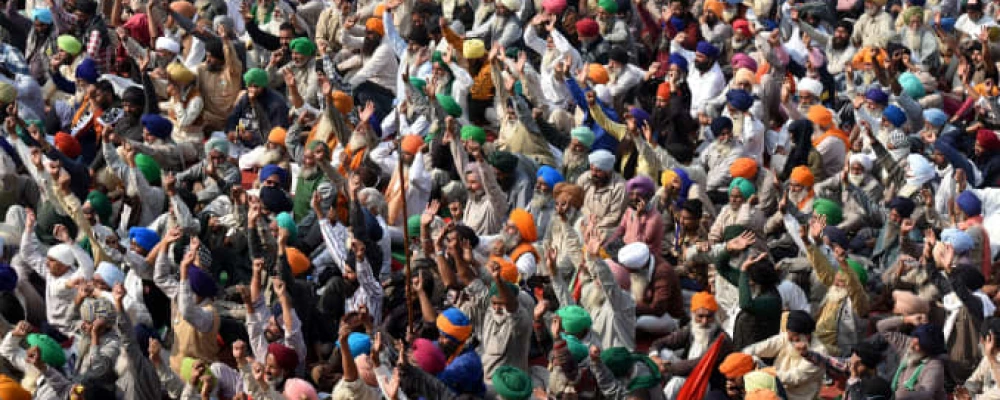
Highlights From The Virtual Oxford Real Farming Conference 2020 - Part One
The Oxford Real Farming Conference (ORFC) was started in 2010 by Colin Tudge and Ruth West (founders of the Campaign for Real Farming) and agricultural writer, Graham Harvey, to highlight the alternatives to conventional farming and to offer all farmers a different kind of farming conference.
Its radical and inclusive programme is suggested and developed by its delegates and is the result of a call for submissions, allowing a broad perspective of ideas and proposals from farmers and growers, scientists and economists, activists and policy-makers. The ORFC has guiding principles to help support these topics of conversation: being radical, offering practical solutions, a friendly inclusive tone, promoting farming to a wider audience and offering a space for networking.
This year's ORFC was virtual, and over 9 days saw 500 sessions take place. You can watch all recordings here, and find a full programme here.
In this article, we take a look at a few of the key sessions for us. Not overtly related to textiles, yet these discussions are still gripping in terms of the affects farming has on land, on farmers' livelihoods and health, on seed sovereignty, and so on, which has a place in how textiles are grown, processed and produced - and then return.
Part two and three will follow.
Thumbnail image from Getty Images.
The Farmers’ Strike and the Struggle Against Corporate Control in India
Since November 2020, Indian farmer groups have been protesting in the capital city of Delhi. In the largest protest of its kind by farmer groups in over 30 years, farmers have received the support of all opposition parties in the country, of solidarity demonstrations internationally, of Indian trade unions and even Rihanna. But the Indian Government isn't happy.
The strike centres on a package of three laws passed by Narendra Modi’s BJP government.
- One of these laws de-regulate sales areas in the country and open it up to the free market.
- The second one promotes contract farming in India allowing for greater corporatisation of Indian agriculture.
- The third one promotes hoarding for agribusinesses.
The farmer groups are striking about the laws above, but also are fighting to receive Minimum Support Price (MSP) for their farming produce. This ORFC session was led by representatives of small farmers and the farmers’ movement in India.
Speakers: Kannaiyan Subramanian, Ashlesha Khadse and Rohit Parakh
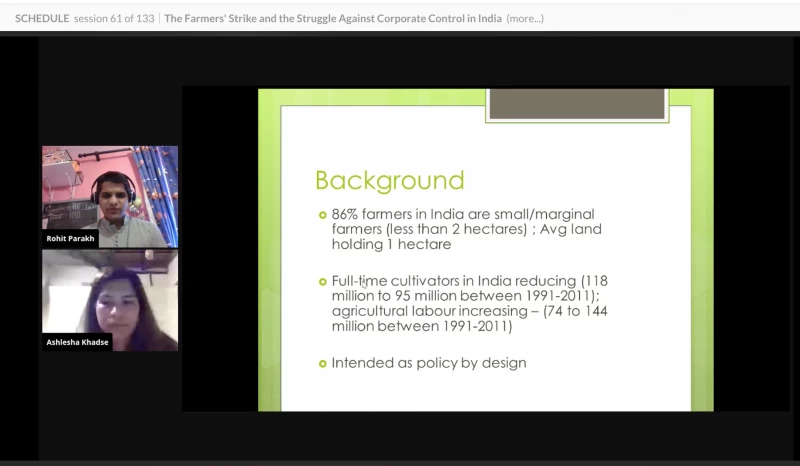
What the laws and demands are.
The three farmer laws that have been proposed:
- The Farmers Produce Trade and Commerce Act (AMPC Bypass Act), 2020 - for the marketing of agricultural produce
- Farmers Agreement on Price Assurance and Farm Services Act, 2020 - for the pre-agreed contracts with farmers
- Essential Commodities (Amendment) Act, 2020 - for the storage of crops and produce
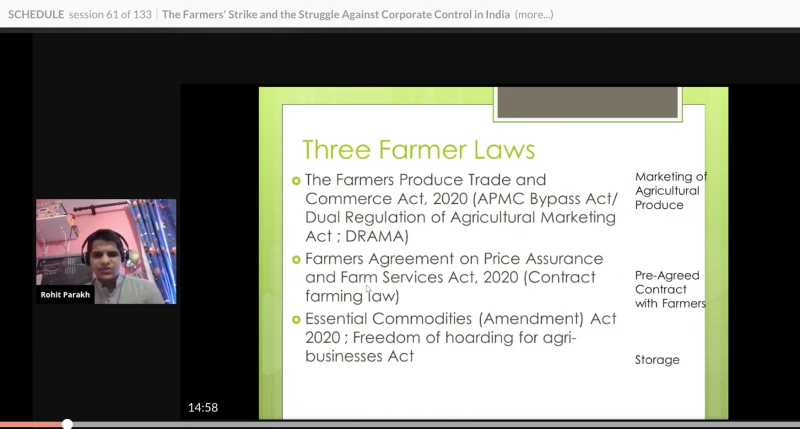
APMC Bypass Act
Deregulation of trade areas incentivises farmers to go to private trade areas where there’s no fee. But there are conditions in place so that a farmer can’t then go to court if the chain falls apart. The Act means that anyone can purchase directly from the farmer without registration, subsequently meaning there is no regulation on the price paid to farmers.
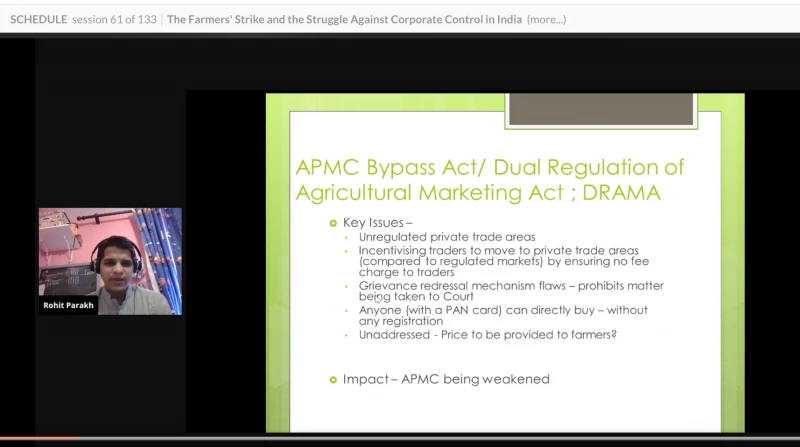
Contract Farming Act
- Contracts are not designed in favour of the farmers, with better terms for larger farmers - however, we already know that 86% of Indian farmers are smallholders with average land size of 1 hectare.
- There are issues globally - this is not just an issue in India.
- GM cotton is a big issue within the wider framework of contract farming.
- By being under contract, there are no Government regulations, and the language surrounding how land is cultivated isn't regulated either, meaning farmers do not need to have good farming practices - GM, pesticides and fertilisers are still ok under contract farming.
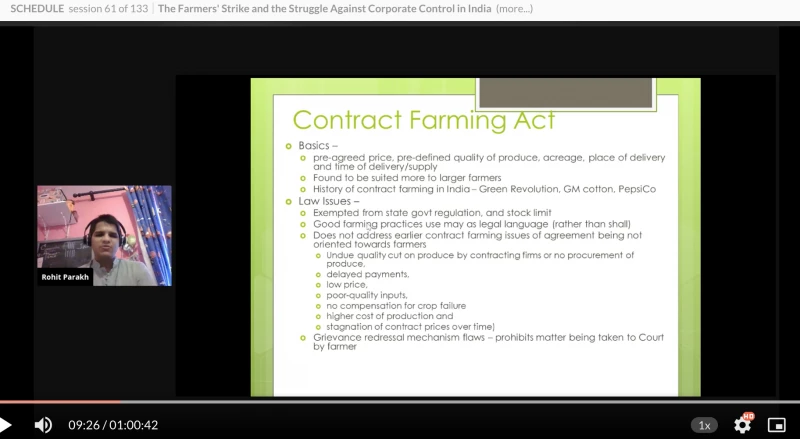
Freedom of hoarding act
One of the issues noted with fluctuating market price is that farmers have to sell when their crop is processed and done, rather than waiting until the market has bettered. This is explained by Aneel Kumar Ambavaram in his lesson on Market Pricing, Demand and Opportunities for Regenerative Cotton. Smallholder farmers do not have the space or capacity to store lots of stock, and even then, these new laws would pass that there is a stock limit, meaning farmers couldn't hold the stock even if they had room.
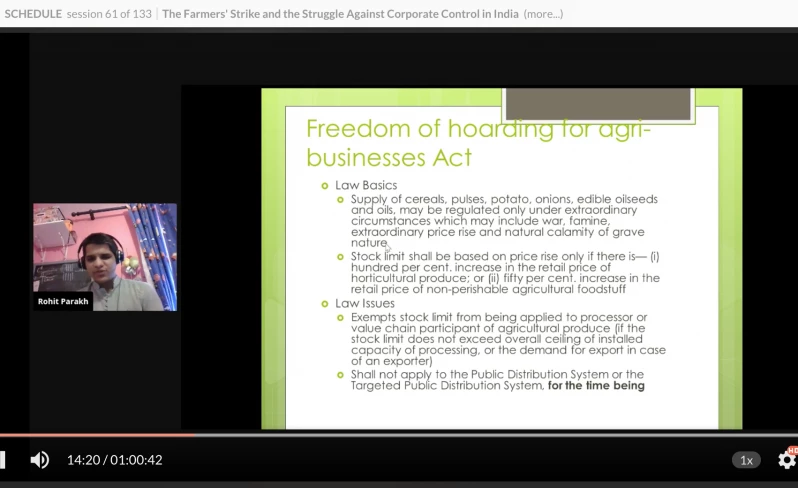
Minimum Support Price.
The MSP comes from the public procurement of certain crops, that government agencies purchase at a promised price to the farmers and cannot be altered. However, only 23 crops have been declared under the new laws that would achieve a minimum support price. There is no insurance for crop failures or climate disasters.
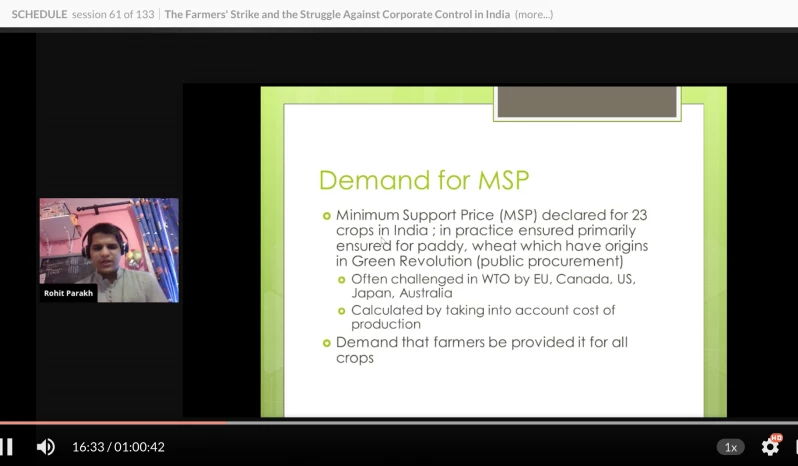
On the ground.
Ashlesha Khadse is part of the Amrita Bhoomi Center – a farmer’s agroecology and political education school in Karnataka, India. She has been associated with Indian farmers’ movements as well as La via Campesina, the global peasants’ movement since 2009. Ashlesha explains what the strikes are like on the ground.
- The Acts are opposed by farmers unanimouslly, with wide public support for the protests. Trade unions are critical, and also threatened to halt movement if the Government doesn’t listen.
- India has a huge caste and class-based differentiation, but everyone is joining hands in an entirely non-violent protest, with appointed security teams. However, the Government has been brutal with barricades, water cannons, gas; Labelling protestors are terrorists and separatists.
- Strong representation of women farmers; they are supporting there in kitchens, frontline and at home on the farm, but someone will always replace them in the community if they want to go to protest too.
- The Sikh community has mobilised care.
- Though the strike is for farmers, the Acts impact labourers and agricultural workers who may lease the land or access the market.
- There is support from UK farmers via the Landworkers Alliance towards the UK Government to provide support. It is the corporations that we use who are rejecting 50% of product imported here due to their quality parameters - the knock on effect is on the ground with farmers, not with the big businesses (from speaker Kannaiyan, a farmer connected to La Via Campesina).
>> Watch the full session here. <<
Goats: The Hidden Transformers
"Goats play a transformative role around the world, particularly in harsh environments - reflecting climate, vegetation or conflict. They transform the most indigestible plant material into meat, milk and skins and are also increasing the economic independence and resilience of rural women."
Rothamsted (non-profit research centre) is researching the role of goats in smallholder systems in Malawi and Botswana - focused on nutrition, socioeconomics and parasitology (through targeted selective treatment using metabolites from bioactive plants). Goats have always been a priority for charity Farm Africa, providing goats to vulnerable women living in rural eastern Africa - supported by animal health and business development services, empowering them to increase incomes and improve their families' nutrition.
Meanwhile, in the UK, Bristol’s Street Goat connects families and individuals with the joys of working with animals and nature - increasing understanding of their food. Local people collectively manage and care for them in urban areas, producing sustainable and healthy animal food products reared on overgrown and unusable urban land.
Speakers: Mulugeta Worku, Dr. Lovemore, C. Gwiriri and Guru Thiru
Chair: Prof Mark Eisler
We've included these because goats are in fact a giver of textiles... cashmere and angora! These are all really great initiatives that offer an income through growth rather than a hand out, and allows a holistic approach to working with the animal that provides both regeneration and food. All of these initiatives also provide training, and in the case of Street Goat, it is a CSA, meaning all volunteers and goat owners buy a share in the company.
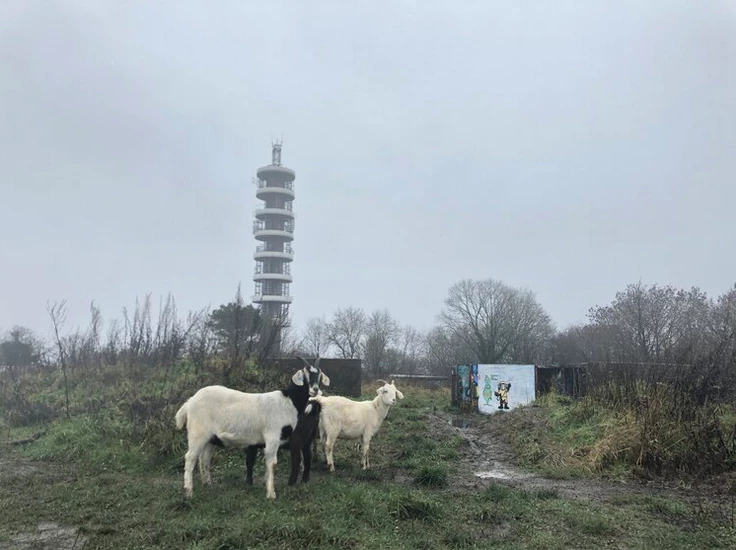
Solidarity Trade: Supporting Social Movements and Environmental Protection Through Fair Trade
The globalised trade system has caused tremendous problems for land rights due to a focus on the consolidation of land for mono-cropped export crops. These crops have undermined diverse localised food systems across the world, what you may have heard referred to as "indigenous food systems".
Some models of trade are rooted in solidarity and can be a force for good that supports traditional farming and forestry systems, create livelihoods, and provide a source of economic power for marginalised communities.
Speakers: Igor Ferreria, Bepkrwa Kayapo
Chair: Jyoti Fernandes
We learnt through our lessons with the WFTO and Traidcraft Exchange, how solidarity in trade can support fair systems that benefit all. Every producer is a business, and needs to be treated as such, rather than the commodity they are trading.
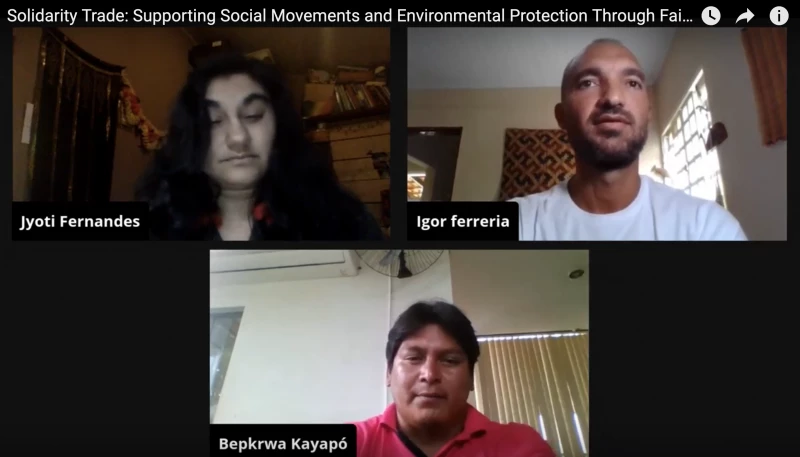
Bepkraw is the village leader and a member of the Association for the Protection of Forests, an NGO founded in the 1990s. It monitors the needs of the community in gathering and selling Brazil nuts, an important income for indigenous farmers. In 1965, the Brazilian Forest Code mandated that private landowners, depending on the state in which they lived, set aside between 20 and 80 percent of native forests and savannas on their rural properties as “legal reserves.” The law has been lauded for its stringent conservation of Amazon forests, and along with NGOs like the Association for the Protection of Forests, allows communities like the Kayapo people in the Amazon protect these reserves, including the Shingu river basin.
Protection of these livelihoods can of course not only bring us joy from products we import, but could also protect greater swathes of land and employment for instance as an alternative to deforestation for soy production. Read reports from the Oakland Institute on how indigenous farmers are being displaced for products such as this.
Igor is from Palestine, and represents two organisations: the Canaan Palestine and Palestine Fair Trade Organisation. They support 2500 farming families in 60 villages on the West Bank in Palestine. This is 70,000 hectares of organic olives and 400 hectares of almonds, with wheat and other arable crops interplanted between the groves.
Jyoti Fernandes of the Landworkers Alliance explained how we should develop a solidarity trade system in the UK to enhance markets for fairly-traded agroecological products. This session showcased the vastness of where our products come from, and can easily be transferred to other commodity crops like cotton.
